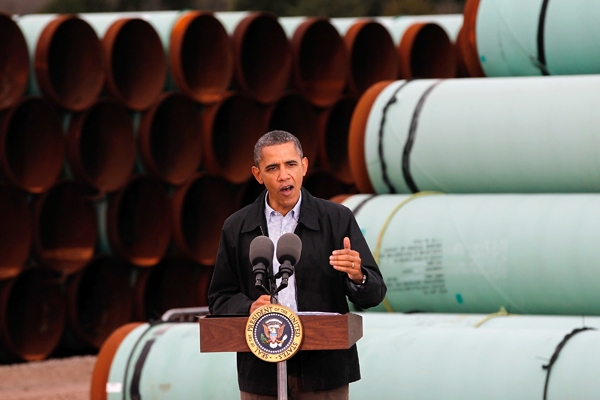CFE Staffer Sarah Ganong reflects on the long fight—and recent victory—around the Keystone XL Pipeline, and what it means for the climate change movement. This is the first in a series of posts about gratitude.
Today’s post kicks off our series about gratitude, just in time for the holiday season. We’re grateful to the many people who give of their time, money, and talent to help out CFE/Save the Sound. And today, we’re especially grateful to those who helped kick the Keystone XL Pipeline to the curb.
When I first joined the environmental movement back in 2011, as a college sophomore, the Keystone XL pipeline was assumed to be a done deal. Signed, sealed, and delivered. Most environmentalists didn’t even want to have the fight, despite the harm the pipeline and its tar sands oil would have done, because the odds looked so bad. But the best things about the David and Goliath stories is that sometimes, David actually wins.
First, some background. The Keystone XL Pipeline would have brought about 830,000 gallons of oil derived from the tar sands of Northern Alberta, Canada through Canadian lands that are the homes of First Nations tribes, down through America’s heartland, and to the Texas coastline to be shipped off for export. Tar sands extraction is incredibly harmful to the landscape and water quality, and the world can’t afford to burn the carbon buried under Alberta’s wilderness if we’re to keep global temperatures anywhere near a safe level. Environmentalists made this case for years, but false arguments about jobs and the need for local energy (the number of permanent jobs from the pipeline would have been very small, and most of the oil was destined for export) seemed to be winning out.
And that’s where activists of all stripes came in. The resistance began in Canada, where First Nations members put their bodies on the line to save their ancestral lands. Thanks to their courageous leadership, resistance started to trickle down the pipeline route. Even as the southern leg was built in Texas, the northern component faced the unusual alliance of indigenous people and ranchers, coming together to defend the lands they all love and the water they all need. And climate activists from across the U.S.—led by 350.org—came together on this too, slowly realizing that Keystone could be a line in the sand.
Without their resistance, the pipeline was a done deal five years ago. Hardly anyone doubted that, but for a few brave individuals standing up in their communities. And they were right.

Last Friday, President Obama became the first national leader, anywhere, ever, to deny a proposed fossil fuel infrastructure project because its climate impacts are more than the world can safely handle. That’s worth repeating. Because of the work of activists just like you and me, who dogged the president at virtually every re-election event, who chained themselves to the White House, who wrote letters and emails, who hid inside components of the pipeline in the south to stop construction for just a few more hours, a carbon bomb was stopped. The world owes them a debt of gratitude. We, collectively, opened the space for our leader to make the right decision, to stand on the right side of history. And now, in the few short weeks before the Paris climate talks that will hopefully result in a new and effective global treaty to address climate change, President Obama has opened that space for other leaders to make these choices too.
Activists of my generation, who have seen Shell pull out of the Arctic, who are starting to see Exxon Mobil held accountable for telling the most dangerous lies the world has ever known, and who have seen TransCanada’s Keystone pipeline denied, are finding our power in the streets and in the halls of government. We’ve cut our teeth on the Keystone fight—and now it’s won. We’re not accustomed to losing and we don’t intend to do so now. Onward to Paris.
Sarah Ganong is in the communications department at CFE/Save the Sound. She’ll be travelling to the Paris climate talks this fall—stay tuned for reports from the field.
